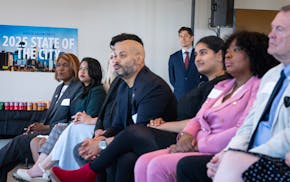Opinion editor's note: Editorials represent the opinions of the Minnesota Star Tribune Editorial Board, which operates independently from the newsroom.
•••
A haunting photo of Hillary Clinton emerged about 48 hours after she lost the 2016 election to Donald Trump.
In it, Clinton is dressed in casual clothes and standing next to a young mom with a toddler tucked into a carrier on her back. Both were out hiking in a Westchester County, N.Y., nature preserve. Days before, Clinton was at the center of the political universe, with every move in her campaign's waning days accompanied by staffers and camera-toting journalists. A day after conceding, she and her husband Bill were enjoying a quiet walk near their home with only a star-struck fellow hiker interrupting their solitude.
The photo captures more than two smiling women. It's also a reminder of how swiftly defeated presidential candidates exit the national stage and are thrust back into ordinary life, potentially even finding themselves in the political wilderness after losing. Gov. Tim Walz is now making a similar warp-speed return to normality after his bid for the vice presidency failed on Tuesday. Unlike Clinton, however, he's still got his political day job as Minnesota's CEO.
That lofty state position and the important work it involves will certainly ease Walz's abrupt re-entry from the political stratosphere. But it also requires him to nimbly shift gears back to Minnesota-specific needs after more than three months of looking at issues through a national lens. As he adjusts, the Minnesota Star Tribune Editorial Board urges him to prioritize a promise made during his first run for governor in 2018, when he vowed to knit a divided state back together as "One Minnesota."
Walz is now in his second gubernatorial term and has two years left. Must-do's on his near-term agenda include working on a budget proposal with his team and getting ready for the Minnesota Legislature's Jan. 14 kickoff. On Friday, the Editorial Board listed high-profile issues for the coming session, including extending the state's reinsurance program or finding an alternative to it. This is critical to prevent eye-watering future health insurance rate hikes for those who buy coverage on their own, such as farm families and the self-employed.
But the second half of Walz's second term also urgently requires making good on that vow to leave the state more united than it was when he took office. It's a monumental task, but it's more vital than ever after the 2024 election, when about half the electorate sees former President Donald Trump as a potential autocrat and the other half sees him as an economic and cultural savior. Emotions are running high and aren't likely to simmer down as Trump moves quickly to implement controversial policies.
Rarely has there been a time when a calm voice and a call to unity are more important. To his credit, Walz acknowledged the need for healing during his first public address to Minnesotans since the election.
"I'm going to try even harder to keep an open mind and an open heart, to really listen to the folks who don't support me or my policies, to work with everyone in the Legislature and seek compromise and common ground," Walz said on Friday. "Because that's how we come back together after such a long time spent fighting each other. That's how we heal the tears in the fabric of our civic society. That's how we move forward — as One Minnesota."
To follow through, Walz must prioritize getting on the road to talk and connect with communities around the state. This strategy would also leverage Walz's impressive skills in retail politics, recently showcased and polished during his vice presidential run.
Other initiatives on the One Minnesota theme are necessary, as well. We look forward to seeing how the One Minnesota message will be refreshed and what innovations Walz might wield to not only reach Minnesotans of all ages but inspire listeners to act for the greater good.
Forging unity would be challenging for anyone, but the degree of difficulty is heightened after Walz's bid for vice president. A running mate traditionally serves an attack dog role. Walz's comments about Trump and some of his supporters being "weird" drew laughs and applause from Democratic supporters on the campaign trail this fall. But that, and other political swings at Trump, leaves Walz with many fences to mend back home, especially in the rural Minnesota counties that overwhelmingly voted for the former president.
Mapping recent Minnesota election results underscores the need for leadership that unites us, and drive home that the urban-rural divide is deepening. Walz's support outside the metro has eroded since his 2018 gubernatorial run. In that first bid, Walz carried 19 counties. In the 2022 election, he carried 13, with the losses mainly in outstate counties, but including suburban Anoka County.
The Harris-Walz ticket also carried fewer Minnesota counties than President Joe Biden did in 2020, which is noteworthy given that this is Walz's home state. In addition, the Harris-Walz margin of victory here eroded. Biden won Minnesota with 52.4% of the vote over Trump's 45.3%. In 2024, the Harris-Walz campaign secured 50.9% of the vote to Trump's 46.7%.
During his vice presidential run, Walz touted many of his policy accomplishments such as free school lunches, one of the nation's most generous child tax credits and historic protections for reproductive health care. These achievements are laudable, but it appears that many Minnesotans need convincing, something that a One Minnesota listening tour could help address, though it's only a start.
Welcome home, Governor. Get a bit of rest from a grueling campaign, while remaining mindful that you've important work to finish on the home front. It's best to get going sooner vs. later.

Rash: At home, Jake Sullivan reflects on events abroad

Opinion: Let's not lose sight of what's best for older adults

Readers Write: Minneapolis politics, Trump's budget, hot tub rentals

